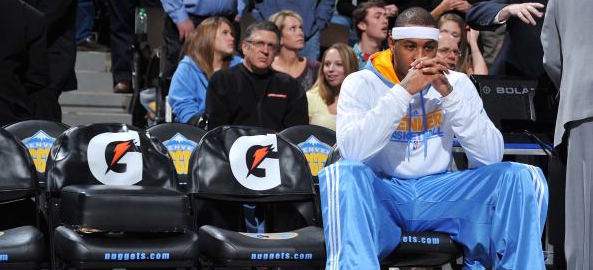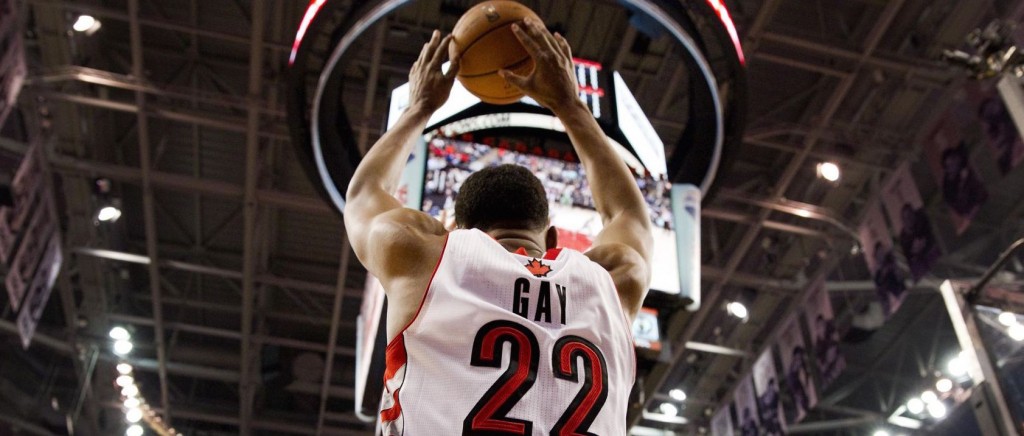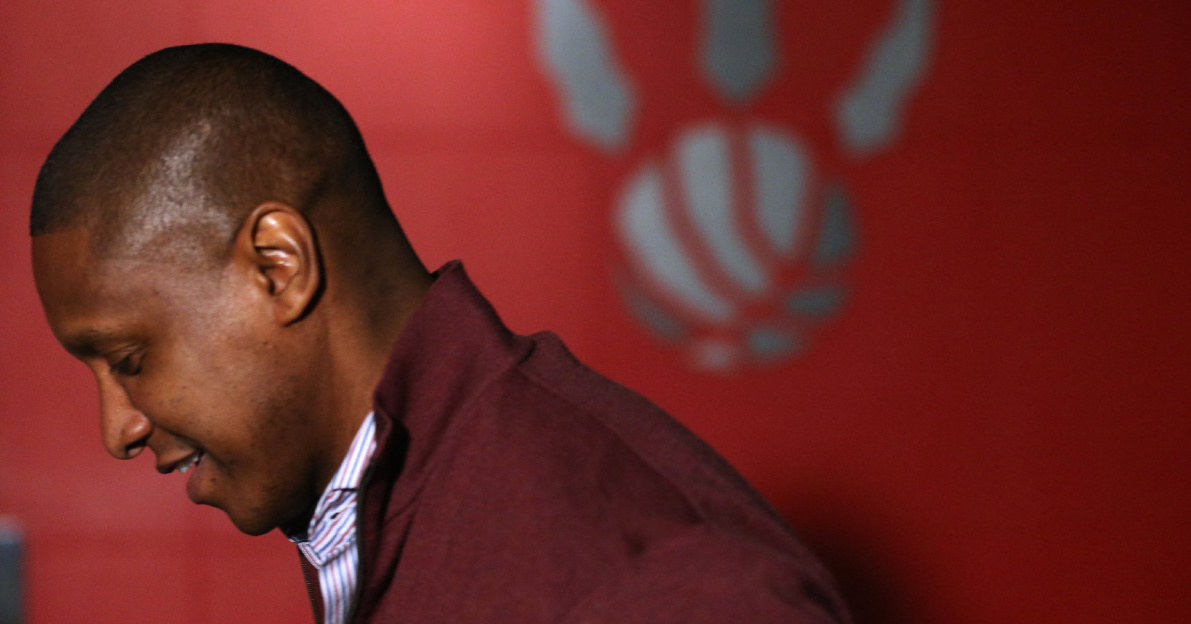When Masai Ujiri was announced as the new president and GM of the Toronto Raptors, most Raptor fans were ecstatic. After living through the wheeler-dealer roller coaster of bad decision-making that was Bryan Colangelo, the more measured and conservative approach of Masai Ujiri seemed like a breath of fresh air.
After Carmelo Anthony forced a trade to the Knicks, not long after Ujiri took over, Ujiri was roundly praised for being able to acquire more than he was expected to from the Knicks, while also keeping the Nuggets in the playoffs and winning 50 games that season1. [aside]1. In the almost four seasons Carmelo Anthony has been with the Knicks, the Denver Nuggets have achieved a better record three of them, and the one they didn’t, they won just one less game.[/aside] He had become one of the league’s most respected GMs which culminated in him winning Executive of the Year in 2013 after the Nuggets won 57 games and became the toast of the NBA.
His arrival in Toronto heralded a new, brighter chapter for an organization that had missed the playoffs 13 times in its 18 years of existence and had become a punchline for fans south of border. Ujiri was touted as a hero after being able to get ANYTHING of value for Andrea Bargnani and then was able to turn the massive overpaid Rudy Gay into some useable pieces that sparked the Raptors into a winning record that pushed them into the playoffs for the first time in five years.
This year, the Raptors should win close to their franchise record 48 games and have home court advantage in the first round of the playoffs for only the third time in franchise history.
So what’s the problem?
Well for starters, after beginning the season 24-8, the Raptors are just 18-21 in 2015 and have lost 13 of their last 18 games. Dwane Casey, who every loved last season, has coached himself out of a job. They are one of the worst defensive teams in the league and fan optimism is as low as it’s been since Colangelo was walking the halls of Air Canada.
While Ujiri doesn’t have the history of bad deals that Colangelo did, it’s often what Ujiri doesn’t do that hurts him.
When he first took over the Nuggets, some may remember the criticism Ujiri took for the length of time he took to iron out a deal with the Knicks for Anthony. Had the Knicks been smart, they would have simply backed out of the deal and waited until summer to sign Carmelo outright, and had that happened it would have been disastrous for Denver.

While Denver had a winning record every year Ujiri was running the franchise, he was never able to acquire an All Star or get past the first round of the playoffs, even when they won 57 games. And part of the problem might have been Ujiri’s unwillingness to take risks.
The only reason Ujiri traded Carmelo was because he was forced to, and even then he waited longer than he probably should have. His next big trade was dealing Nene for JaVale McGee, a risk, to be sure, but Nene had been on his way out of town for years, seemingly, and had been signed to a large deal that Denver immediately regretted when his injury woes continued. McGee was less a risk than the best Ujiri could get for an over-paid and often-injured Nene.
During his tenure in Denver, he never tried to swing for the fences in any deal and opted to remain competitive, after trading away Carmelo, rather than risk a full rebuild, which probably would have been better for the team, long term. In fact, the team’s fortunes have declined since Ujiri left, and not necessarily because he left. Ujiri made few bad deals (although the McGee trade wasn’t good and he overpaid Danilo Gallinari), but he also failed to turn the quantity he had in Denver into quality. We kept waiting for Ujiri to package several of the team’s decent players to grab a star, but he never did. He left Denver with a roster full of mostly overpaid players whose value had already peaked.
In Toronto, Ujiri’s trade of Bargnani, while definitely in favour of the Raptors, was certainly not a risk. In fact, not trading him would have been the bigger risk, considering how despised he had become among Raptor fans. Same goes for Rudy Gay, whose horrible contract and otherworldly inefficient play had made him almost as much a pariah as Bargnani was.

It just took the Raptors stringing a few wins together to stop Ujiri from completing a rumoured deal sending Kyle Lowry to New York, sending the team into a full rebuild. Instead, Ujiri decided to play it safe and stay with a roster that was clearly not as good as it seemed, but was good enough to be a playoff team.
This past summer, Ujiri decided not to risk upsetting the chemistry of a first round playoff team that had won just 48 games2 and decided to focus on bringing back relatively the same roster, rather than try and make any big changes. This strategy pleased the fans, who were happy to finally have a winning team, but, let me paraphrase here, a GM who is worried about pleasing the fans will soon be joining them.[aside]2. Let’s be clear, here. While 48 wins is a franchise record, it’s also only slightly above mediocre. The Raptors are the only franchise that have never had a 50 win season. The fact that the team won a franchise record 48 wins, last year, is more an indictment over how mismanaged the franchise has been since it’s inception and less about how good the team was last year. [/aside]
In playing it safe, Ujiri has built a team that was never going to be as good as many fans hoped. Even with the poor play over the last three months it’s unlikely Ujiri will make any huge changes to the roster. His conservative approach may be more palatable to fans than Colangelo’s shotgun approach (make a bunch of trades and hope one of them turns out), but so far the results are eerily similar to Colangelo. Both took over the team after winning Executive of the Year. Both inherited coaches who inexplicably lead unexpectedly decent defensive teams to a franchise record win and Atlantic Division title in the first year, and then followed it up with a disappointing season, while still making the playoffs.
After his disappointing second season, Colangelo stayed true to who he is and made a big trade to right the ship (trading for Jermaine O’Neal). It’s likely Ujiri will stay true to who he is and only do what is necessary. Firing Casey, no matter how the playoffs go, would be the safe thing to do. Same with letting Lou Williams walk. But it’s a good bet that the core of the team is safe, despite the fact they probably shouldn’t be.
Raptor fans are too loyal and have been wronged for too long to continue to be handed ginger ale and be told it’s champagne. Ujiri’s recent comment that hinted he would like to bring Wiggins to Toronto was a nice thought, but the time to do that would have been last summer, when he was actually available and before he showed he how good he truly will be. Trading DeRozan and Amir (for example) for Wiggins would have been a major risk, but that’s what great GMs do. Jerry West traded a top 10 center, in Vlade Divac, for high school rookie who lasted until the 13th pick in the draft. Even R.C. Buford traded a young PG who had become a favourite of Gregg Popovich for an unproven rookie who couldn’t shoot and dropped to the 15th pick. Neither Kobe Bryant nor Kawhi Leonard were sure things, and trading away good, young, productive players was certainly a risk that could have backfired, but that’s what makes West and Buford great is their willingness to take risks3.[aside]3. Yes, Ujiri did draft a complete unknown with the 20 pick in the draft, but with the player he really wanted (Tyler Ennis) off the table and no one left that they felt would really make much of an impact, it wasn’t as big a risk as it seemed. Plus, it never risked the team’s record.[/aside]
Fans may not like the idea of trading a Lowry or DeRozan or even a Valanciunas, but those that don’t learn from history are doomed to repeat it. Glen Grunwald tried to hold together a flawed roster too long and Rob Babcock ended up as the GM. Then Babcock waited too long to trade Vince Carter and got relatively nothing for him.
Bryan Colangelo took over a team whose best player was Chris Bosh. Instead of realizing the limitations of a team built around a second banana (at best), he tried to make it work until it became obvious enough to Bosh that he left.
Now the Raptors are stuck with a roster full of decent to pretty good players that is simply too limited to become the team Raptor fans deserve.




